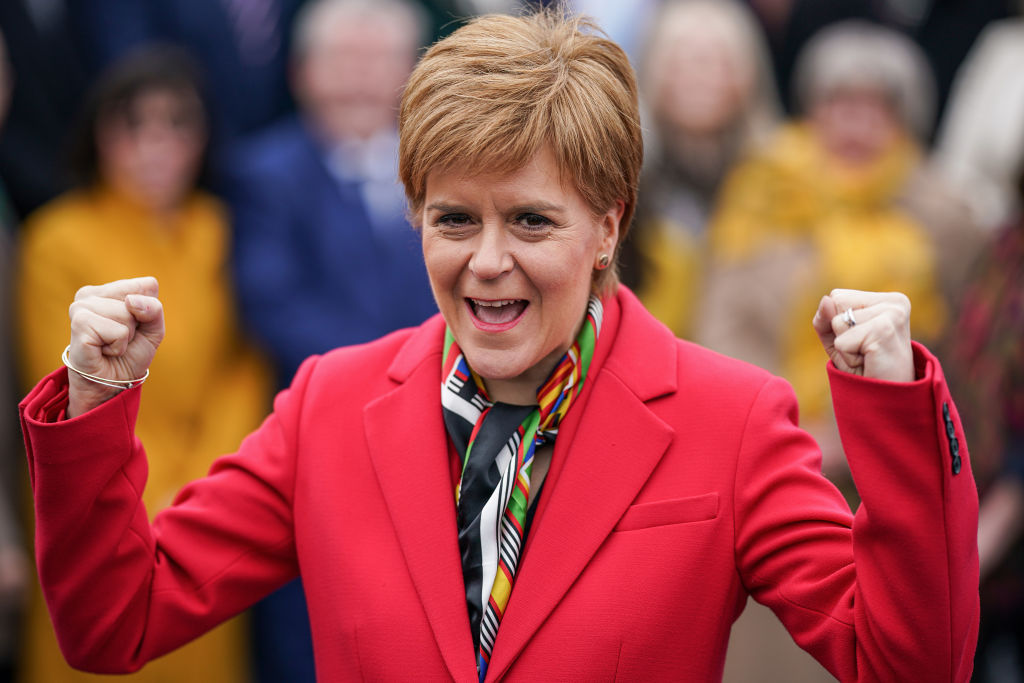Nicola Sturgeon is busy demanding a second referendum on whether Scotland should leave the UK. Boris Johnson should ignore her. And the last few years of British politics shows exactly why.
If there is one lesson that Brexit has taught the country since the referendum, it is that if the public are to be asked questions of national importance, then the details ought to be properly spelled out beforehand. We now have an idea of what Brexit means: with the whole country leaving the EU’s single market and customs union, the end of the jurisdiction of the ECJ, but with Northern Ireland more closely aligned in areas of the economy with the Republic of Ireland than Great Britain in order to avoid a hard border.
Nicola Sturgeon knows this. She’s spent three years decrying the lack of detail in the Brexit position of the government, in what was put to the people and it’s a large part of how she span the need for a second referendum. Now though, she is tub-thumping for a second independence referendum with all the same problems she identified in Brexit. Yet she is aiming to ignore these simply on the basis of the increased number of MPs returned with an SNP rosette to Westminster last week.
We do not know what the future trade relationship looks like with the EU. This is what all of next year will be about. Possibly beyond. With the UK leaving the EU at the end of January, and with a trade agreement to be decided later, the obligations of any potential independent Scottish state are left up in the air.
Should the SNP win an independence referendum in the next year, they’ll be applying from a half-way house. In with all the rules. But out of the club. Legally out. That’s important.
The EU, as has been made very clear again and again, is a legalistic club. Being out means having to reapply. That would mean having to sign up to join the euro, and Schengen and budgetary rules the SNP have so far shirked from. In the meantime it would mean having to adopt a new currency, austerity beyond anything of the past ten years, and bold commitments to competitive neoliberal markets that would likely leave a few of the SNP’s more left-wing voters out in the cold.
Without the FTA in place, or indeed whether there’ll be one or not, we do not yet know the relationship that will exist between the UK and the EU. If the UK has left the Single Market and the Customs Union, then any independent Scotland would need to have a border with England if they wanted to rejoin the EU. This is a legal fact, it is the reason why we’ve spent years wrangling about the issue on the island of Ireland. And the reason why the DUP are so angry with Boris for his stance on checks between Great Britain and Northern Ireland.
If the UK is also doing concurrent deals with the USA, Australia, New Zealand, and other close allies, then Scots deserve to know the details of those deals too if they’re to decide if their country’s future is just as a mere region of Europe or part of a global Britain. Six million people with Scottish descent live in the USA, four million in Canada, nearly another two million in Australia. Just 45,000 live in France. Scots have a right to choose the English-speaking world with the rest of the UK once they know what that relationship looks like.
Some Remainers, knowing that they’ve lost the battle to keep the UK as a whole in the EU, should think twice about siding with nationalists in Wales, Scotland, and even England to break up Britain to try and make them subservient to Brussels. A third of Labour voters and just shy of half of Liberal Democrat voters went tactically with these parties to stop another getting in. The figure voting
tactically in Scotland was slightly higher than the rest of the UK too, at just under thirty per cent of the total. Unionists really are found right across Britain. And they do not appreciate the idea of their country being sold out from under their feet.
Having turned away from their project on Europe, if they go down the route of trying to break up Britain they should not be surprised if the nation’s voting public decides to turn on their other pet projects.
All of this, of course, doesn’t include another basic fact: in 2014, Scotland voted No to Independence; and yes to remaining within the UK as part of the broader British nation. Nicola Sturgeon herself described that particular vote as a ‘once-in-a-lifetime’ event. The first minister should remember those words.
Instead, Scots seem destined to endure years of wrangling over the country’s constitutional future, as Sturgeon fans the flames of division to divert from a dismal record on health, an education system where children from the poorest backgrounds in England are more likely to go to university than those in Scotland. And the SNP’s record on policing, with crime on the rise for the past four years.
The First Minister should forget her second independence referendum and get on with the day job she’s currently failing at.






Comments